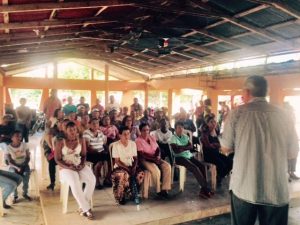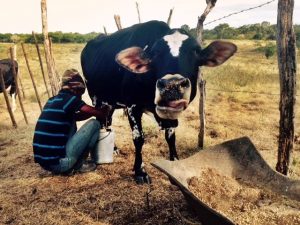This project is made possible through the partnership of WATER CHARITY and the NATIONAL PEACE CORPS ASSOCIATION. ![]()
This project has been completed. To read about the conclusion, CLICK HERE.
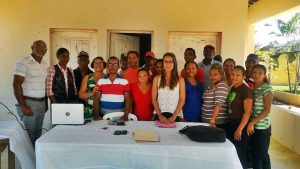 Location
Location
This project summary has been redacted for security reasons to omit the specific project location.
Xxxxxx, Dajabon, Dominican Republic
Community Description
Xxxxxx is a small rural community of around 230 families (750 individuals) located in the province of Dajabon on the Northwest of the Dominican Republic. The climate is very dry and rainwater is a rare occurrence. Regardless, many animals are found within the community such as cows, pigs, sheep, chickens, ducks, dogs, among others. As an agricultural community, the majority of jobs consist of dairy farming, teaching at public schools, or owning a bodega in the community. Many families rely on cows for their livelihood, either by selling the milk or meat or keeping the cow for themselves to feed the family.
The education system is quite poor and many students drop out of school to work as a dairy farmer to help their families. The graduation rate in the community is quite low because there is no motivation to continue to study.
The individuals are very religious and many attend church regularly on Wednesdays and Sundays. Pastimes in the community include playing dominos, dancing the bachata or merengue, and playing baseball. Dominicans like to have a good time and always find a way to brighten their day through social activities.
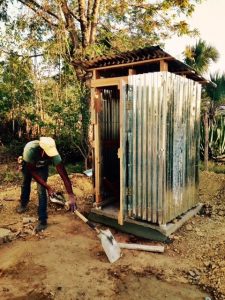 Many Haitian immigrants enter the community to find a job and these individuals are the most vulnerable in the population. The changes that the community will most like to see are (1) more water running throughout the community, (2) receiving a garbage truck to pick up all the waste, and (3) having a better healthcare system.
Many Haitian immigrants enter the community to find a job and these individuals are the most vulnerable in the population. The changes that the community will most like to see are (1) more water running throughout the community, (2) receiving a garbage truck to pick up all the waste, and (3) having a better healthcare system.
Problem Addressed
Due to the lack of, or poor, conditions of many latrines in this small rural community, many individuals from families of low socioeconomic status defecate in their backyard, causing damage to the environment and to the community.
With the help of many donations, 21 new latrines were built in the community in the Winter of 2016. There is, however, still great need. In a primary community diagnostic, 221 homes were surveyed and 86% of homes were found to use latrines. Of these, 37% of latrines were found to be in poor condition and 10% were found to be shared among family members or neighbors.
Project Description
This project is to build 32 latrines in the community.
Help with a latrine project has been the priority of the community since soliciting a PC volunteer in the summer of 2015, and one project of 21 latrines has now been completed. This new project aims to help additional families with need, selected by the Latrine Committee.
The Latrine Committee was created during the previous project, consisting of the Peace Corps volunteer and health promoters of Centro de Madres. The committee is excited to continue working with a second stage and has already determined and selected the beneficiaries most in need. The criteria used to select individuals included: families who lack a latrine, the number of family members within a family, the number of children in the family, and the health situation of each family. Other responsibilities of the Latrine Committee will include educating families through a health and hygiene course, soliciting possible donations, and contacting the previous local mason to begin work.
As for the families who will receive the latrines, they will have to participate in and graduate from a health training and latrine maintenance course taught by the health promoters of Centro de Madres. The families will also be involved specifically through financial donations to the project including providing materials, labor, food and the mason’s pay.
As for the construction process, the latrines will be built by the local mason who has built these exact latrines in the community during the first latrine project. With such experience, the masons will construct efficient and suitable latrines for each of the 32 families.
The educational component will allow 70 individuals (approximately 2-3 people per family) to be trained on topics such as personal hygiene and how to take care of and properly maintain a latrine. The outcome is to help mitigate sanitation and health problems to allow families to maintain safe and sanitary latrines and to increase the overall quality of life.
In order for this project to be a success, these specific steps are to be taken:
-First, there is the implementation of educational components on the use and importance of latrines.
-Then, once funds arrive, the Latrine Committee will notify the families already selected to receive a latrine and the mason. The funds will specifically be used to purchase materials for the latrines.
-Then the construction of the latrines will begin. The process will take around 2-3 weeks, depending on the flexibility of the mason.
-Once all the latrines are built, there will be an assessment of the correct use and maintenance of the improvements.
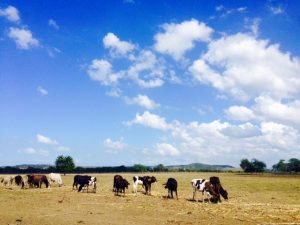 Project Impact
Project Impact
110 people will benefit from the project.
Peace Corps Volunteer Directing Project
R. Wright
Monitoring and Maintenance
Education, capacity building, and community involvement are the key to the sustainability of the project. At least one family member from each beneficiary family will have knowledge in latrine construction and maintenance, thus will be able to repair and care for the family latrine without seeking outside assistance. Moreover, after the project ends, families will be able to spread the knowledge and skills gained from the training to practice healthy behaviors.
The women from the Latrine Committee will visit all beneficiary families after two months to see whether families are using the new latrines, are implementing healthy practices, and are retaining health knowledge. In addition, a pre- and post-test will be given out to the families to make sure that the health education component was delivered in a sustainable manner.
Lastly, the project can continue since the Latrine Committee members, the masons, and the beneficiary families will have skills to move forward with designing implementing and evaluating future community-based projects.
Fundraising Target
$4,300
Funds raised in excess of the project amount will be allocated to other projects in the country.
Donations Collected to Date
$4,300
Dollar Amount Needed
$0 – This project has been paid for by an anonymous donor.
Additional donations will be used for other projects in the Dominican Republic.
Conclusion of Dajabon Latrine Project – Dominican Republic
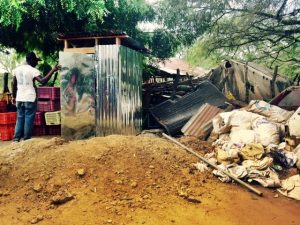
This project has been completed under the direction of Peace Corps Volunteer Rosemary Wright. To read about the start of the project, CLICK HERE.
The project was designed to build 32 latrines in the community.
Rosemary reports:
THE SCOPE OF THE PROJECT
Due to the lack of or poor conditions of many latrines in a small rural community located in the northwestern part of the Dominican Republic, many individuals from families of low socioeconomic status defecated in their backyard, causing damage to the environment and to the community. With the help of Water Charity, 33 new latrines were built in this small community in the Summer of 2017.The latrines consisted of a circular pit dug into the ground, covered by a hygienic concrete floor, and surrounded by a shelter made of wood and metal sheets. Each step of the process to build the latrines required participation from the community, primarily from the Latrine Committee, the local mason, and the families receiving the latrines.
The beneficiary families were required to pass health training and latrine maintenance classes presented by the women in the Latrine Committee. The latrine project greatly helped the beneficiary families by mitigating health risks such as the risk of fecal-oral disease transmission, improving overall sanitation, and helping implement basic health and hygiene practices.
SPECIFIC WORK THAT WAS DONE
Every family has learned the importance of sanitation and hygiene, including washing hands, how to make a hand washing station, and how to properly manage a latrine. The families learned how to find basic items such as sand and gravel to build their proper latrine, because this was required of them before the construction began.The project helped the Latrine Committee members to develop leadership and project management experience, including developing many skills such as project design, implementation, money management skills, and income generation. The Latrine Committee is better equipped to initiate, implement, and own future projects for the community. Additionally, the mason developed valuable skills in latrine maintenance and repair and will be able to share these skills for generations to come. Now that this is his second time doing the project, he is very skilled with the maintenance and construction of each latrine.
HOW THE WORK PROGRESSED THROUGH EACH STAGE
The project was mostly done by the community. During the previous latrine project, a Latrine Committee was created, consisting of the Peace Corps volunteer and health promoters of Centro de Madres. The committee was excited to continue to work with a second stage and selected the beneficiaries most in need. They educated each of the 33 families that were selected through a health and hygiene course, solicited possible donations, and contacted the previous local mason to begin work.The mason purchased the materials with the Peace Corps volunteer in the nearest town. After the purchases were made, the mason worked on one latrine a day, five days a week. During the construction, young men would help out with digging the hole, mixing the cement, and molding the toilet. The families receiving the latrines were responsible for providing additional materials, labor, food and the mason’s pay.
END RESULT
A total of 33 latrines were built in the community, all with a hand-built hand station. There is improved community health and sanitation with improved pit latrines.At least one family member from each beneficiary family has gained the knowledge in latrine construction and maintenance, thus will be able to repair and care for the family latrine without seeking outside assistance. Moreover, families will be able to spread the knowledge and skills gained from the training to practice healthy behaviors.
Lastly, the project can continue since the Latrine Committee members, the masons, and the beneficiary families will have skills to move forward with designing implementing and evaluating future community-based projects. The community is very happy about the implementation of the latrines and hope to receive more latrines in the near future.
COMMENTS FROM THE COMMUNITY
A personal story from one of the beneficiaries:
It a hot afternoon and the mason is working vigorously on a latrine that was demanded by a man who was in need of one. Before the construction of the bathroom, the man and his family were either using the neighbors’ latrine or, during the evening and night, using the backyard as a bathroom. The backyard reeked of urine and fecal matter.Once informed of the project, the man told the Peace Corps volunteer he would like to be the first to receive a latrine. The volunteer told him if he digs a hole within a week he could have his materials. The next day, the volunteer saw him profusely digging the hole himself at 1 o’clock in the afternoon, not giving up because he knew this was worth the time and effort. He promised his family that they will have their own latrine to use and the kids were very excited about this.
The next day, he found the materials himself and the mason went to work that very day. Now a latrine in the backyard, the area smells a little less every day and the family can now feel comfortable using their own bathroom. The man thanks God daily for this opportunity and will someone repay his debt to another family in need.
We extend our thanks to Rosemary for completing this important project.
